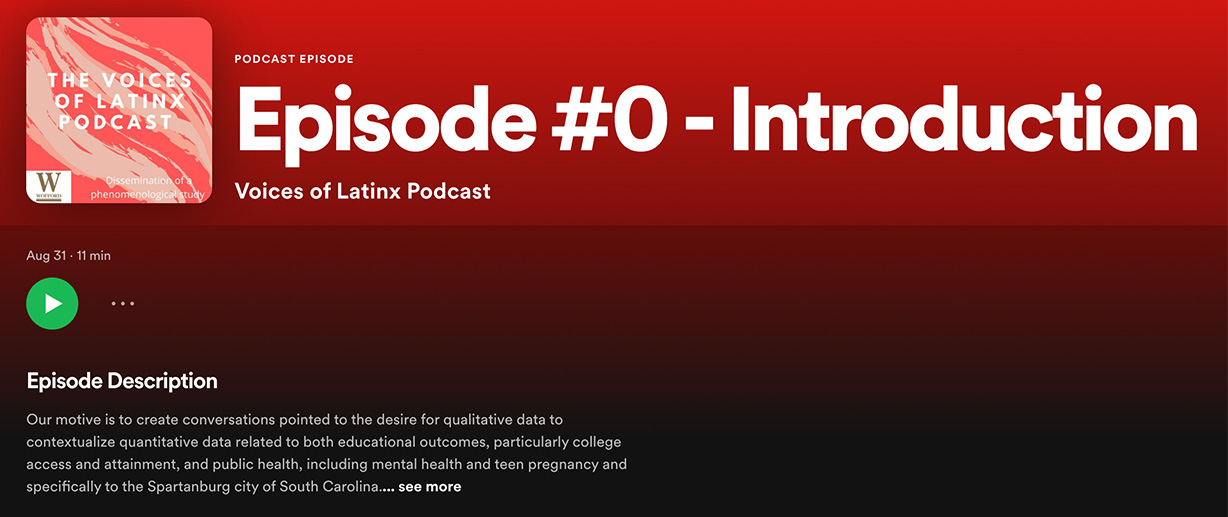SPARTANBURG, S.C. — For the past three years, Dr. Christine Dinkins and Dr. Laura Barbas Rhoden, along with a small team of Wofford College students, have spent their summers conducting research with the intent of creating more inclusive environments for Spartanburg’s Latinx populations and a better understanding of how Latinx students spend time outside of school.
The research has included interviews with community members.
“We were focused on out-of-school time, but we let each participant take the conversation wherever they wanted,” says Dinkins, the college’s William R. Kenan Jr. Professor of Philosophy. “For instance, the initial question for each interview was ‘tell me about what a typical day looks like for you outside of school,’ but from there we branched out and talked about who they spent time with and what kinds of conversations they felt comfortable having with their parents.”
This past summer, they shifted their focus from gathering data to spreading their results back into the community. Traditionally, researchers would publish a paper in a journal, and anyone interested in the research would download and read it. However, the team worried that this might be alienating for some.
“We were looking for ways to disseminate information to community members who wouldn’t necessarily dig through a 40-page research report,” says Barbas Rhoden, a Spanish professor at Wofford.
For 10 weeks over the summer, Wofford students worked with data that had been collected by previous years of research, as well as reports from non-profit institutions, and thought of ways to communicate their findings to Spartanburg.
According to Barbas Rhoden, the students decided that a podcast would allow ordinary people to access the data they had collected without having to read dense academic literature.
“Listening to an audiocast or a short video clip is one way of reaching people on their terms, rather than asking them to come to a website and download a report,” says Barbas Rhoden.
Their “Voices of Latinx” podcast has a personal nature that allows students such Mariana Gonzalez, a senior a psychology major from Hickory, North Carolina, to relate the findings to their own lives.
“We talked about our findings around the family dynamics in the Hispanic community and compared that with our experiences,” says Gonzalez. “For example, I never went to anyone else’s house because my parents didn’t always know who they were. Going to sleepovers just wasn’t something we did. We talk about those differences, and how they’ve shaped who we are.”
According to Hector Ortiz, a junior biology, philosophy and Spanish major from Saluda, South Carolina, the experiences of the community reflected his own experiences.
“In a lot of our research interviews, we heard our own stories,” says Ortiz. “It was just about getting to what it means to be Latinx here in Spartanburg.”
Mayra Lomeli-Garcia, a senior psychology and Spanish major from Charleston, South Carolina, agrees.
“Growing up Latinx, I was surrounded by my own culture and problems,” says Mayra Lomeli-Garcia. “It was eye-opening to go out and see that there are people having the same problems that I was (experiencing). It was nice to be able to share my own story with the community and relate that to our research.”
As of now, there are three episodes of “Voices of Latinx,” with plans to produce more. Episodes are currently available on Spotify and Youtube. The research team also produced a podcast called “College Ready in SC,” which aims to help first-generation students prepare for the college application process. Episodes are available in both English and Spanish.
Gonzalez says that her time working with Dinkins and Barbas Rhoden helped her grow as a person.
“It made me step outside my comfort zone,” says Gonzalez. “I was going to places that were stigmatized, but I learned to understand that there’s a reason that things look the way they do and to treat people with compassion. The environment that you’re in influences the opportunities that you have. We all have the potential, it’s just that some people don’t have the resources.”
